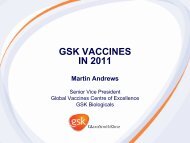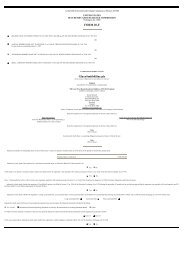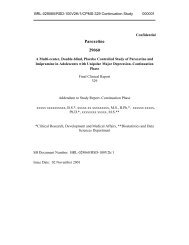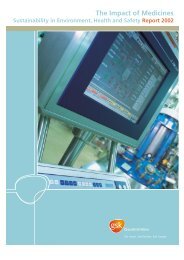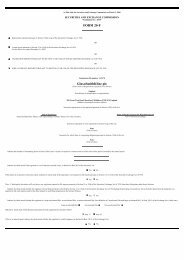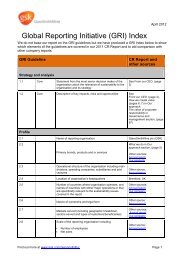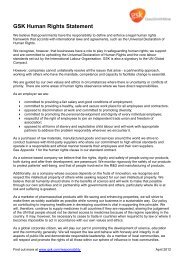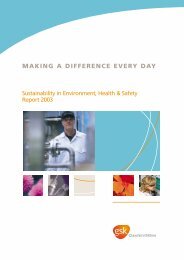GSK Annual Report 2002
GSK Annual Report 2002
GSK Annual Report 2002
You also want an ePaper? Increase the reach of your titles
YUMPU automatically turns print PDFs into web optimized ePapers that Google loves.
Stricter regulatory controls also heighten the risk of withdrawal by<br />
regulators of an approval previously granted, which would reduce<br />
revenues and can result in product recalls and product liability<br />
lawsuits. In addition, in some cases the Group may voluntarily<br />
cease marketing a product or face declining sales based on<br />
concerns about efficacy or safety, whether or not scientifically<br />
justified, even in the absence of regulatory action.<br />
Continued development of commercially viable new products is<br />
critical to the Group’s ability to replace sales of older products that<br />
decline upon expiration of exclusive rights, and to increase overall<br />
sales. Developing new products is a costly, lengthy and uncertain<br />
process. A new product candidate can fail at any stage of the<br />
process, and one or more late-stage product candidates could fail<br />
to receive regulatory approval. New product candidates may appear<br />
promising in development but, after significant investment, fail to<br />
reach the market or have only limited commercial success as a<br />
result of efficacy or safety concerns, inability to obtain necessary<br />
regulatory approvals, difficulty or excessive costs to manufacture<br />
or infringement of patents or other intellectual property rights<br />
of others.<br />
The Group is currently a defendant in a number of product liability<br />
lawsuits, including class actions, that involve substantial claims for<br />
damages related to the Group’s pharmaceutical products. See<br />
Note 30 to the Financial statements, ‘Legal proceedings’ for a<br />
discussion of proceedings in which the Group is currently involved.<br />
Litigation, particularly in the USA, is inherently unpredictable.<br />
Class actions that sweep together all persons who were prescribed<br />
the Group’s products may inflate the potential liability by the force<br />
of numbers. Claims for pain and suffering and punitive damages<br />
are frequently asserted in product liability actions and, if allowed,<br />
may represent potentially open-ended exposure. Unfavourable<br />
resolution of these and similar future proceedings may be material<br />
to the Group’s financial results. The Group may also make material<br />
provisions related to legal proceedings, which would reduce its<br />
earnings.<br />
Recent loss experience within the insurance industry as a whole,<br />
including pharmaceutical product liability exposures, has increased<br />
the cost of insurance coverage for pharmaceutical companies<br />
generally, including the Group. In order to contain insurance costs<br />
in <strong>2002</strong> and 2003 the Group has adjusted its coverage profile,<br />
accepting a greater degree of un-insured exposure.<br />
The Group is responding to governmental investigations in the<br />
USA into pricing, marketing and reimbursement of several<br />
prescription drug products. These investigations could result in<br />
related restitution or civil false claims act litigation on behalf of the<br />
federal or state governments and proceedings initiated against<br />
GlaxoSmithKline by or on behalf of consumers and private payers.<br />
Unfavourable resolution of these and any similar future government<br />
investigations may be material to the Group’s financial results.<br />
The Group may also make material provisions related to such<br />
investigations, which would reduce its earnings.<br />
The environmental laws of various jurisdictions impose actual and<br />
potential obligations on the Group to remediate contaminated<br />
sites. The Group has also been identified as a potentially<br />
responsible party under the US Comprehensive Environmental<br />
Response Compensation and Liability Act at a number of sites for<br />
remediation costs relating to the Group’s use or ownership of such<br />
sites. See Note 30 to the Financial statements, ‘Legal proceedings’<br />
for a discussion of environmental-related proceedings in which<br />
the Group is involved.<br />
Operating and financial review and prospects GlaxoSmithKline 65<br />
The Group had eight products with over £700 million<br />
($1.05 billion) in annual global sales in <strong>2002</strong>. Among these<br />
products are Paxil/Seroxat and Wellbutrin, with respect to<br />
which the Group is currently defending its intellectual property<br />
rights in the USA. If these or any of the Group’s other major<br />
products were to become subject to a problem such as loss<br />
of patent protection, unexpected side effects, regulatory<br />
proceedings, publicity affecting doctor or patient confidence<br />
or pressure from competing products, or if a new, more<br />
effective treatment should be introduced, the impact on the<br />
Group’s financial results could be significant.<br />
The Group conducts a substantial portion of its operations<br />
outside the United Kingdom. Fluctuations in exchange rates<br />
between sterling and other currencies, especially the US dollar<br />
and the Euro, materially affect the Group’s financial results.<br />
The Group is increasingly dependent on information technology<br />
systems, including internet based systems, for internal<br />
communication as well as communication with customers and<br />
suppliers. Any significant disruption of these systems, whether<br />
due to computer viruses or other outside incursions, could<br />
materially and adversely affect the Group’s operations.<br />
The Group has no control over changes in inflation and interest<br />
rates, foreign currency exchange rates and controls or other<br />
economic factors affecting its businesses or the possibility of<br />
political unrest, legal and regulatory changes or nationalisation<br />
in jurisdictions in which the Group operates. These factors<br />
could materially affect the Group’s future financial results.<br />
The effective tax rate on the Group’s earnings benefits from the<br />
fact that a portion of its earnings is taxed at more favourable<br />
rates in some jurisdictions outside the United Kingdom.<br />
Changes in tax laws or in their application with respect to<br />
matters, such as transfer pricing (see Note 12 to the Financial<br />
statements, ‘Taxation’), that relate to the portion of the Group’s<br />
earnings taxed at more favourable rates could increase the<br />
Group’s effective tax rate and adversely affect its financial<br />
results.<br />
New or revised accounting standards and rules promulgated<br />
from time to time by UK, US or International accounting<br />
standard-setting boards could have a material adverse impact<br />
on the Group’s financial results.



